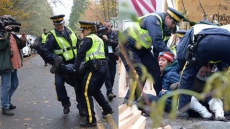OTTAWA — The Supreme Court of Canada has set aside a man's gun- and drug-related convictions, saying police had no reasonable cause to walk into a backyard and begin questioning him.
The 3-2 ruling comes today in the case of Tom Le, a 20-year-old Asian-Canadian man who was arrested by police at a west Toronto housing complex in May 2012.
Le was chatting with four young black men in a backyard one night when police officers showed up.
The officers were told by security guards who patrolled the housing co-operative that this was a "problem address" over concerns about drug trafficking in the rear yard.
Two officers entered the yard without consent or a warrant, and began asking questions and requesting identification. A third officer patrolled the property's perimeter, then stepped over a low fence and told one man to keep his hands where he could see them.
An officer questioned Le, demanded ID and asked about the contents of a satchel he was carrying.
Le fled but he was soon tackled and apprehended a short distance away with the bag containing a loaded handgun, cocaine and a considerable amount of cash.
At his trial, Le argued the police violated his constitutional rights to be free from arbitrary detention and unreasonable search and that the evidence should be excluded.
The trial judge found that the police had legally detained Le, who unsuccessfully challenged the conviction in the Ontario Court of Appeal. He then took his case to the Supreme Court.
In its decision, the high court says the actions of police that night seven years ago did amount to arbitrary detention, a serious violation of Le's charter rights.
It says the reputation of a community — or the frequency of police contact with its residents — does not in any way license police to enter a private home more readily or intrusively than they would in a community with higher fences or lower rates of crime.
"Requiring the police to comply with the charter in all neighbourhoods and to respect the rights of all people upholds the rule of law, promotes public confidence in the police and provides safer communities," the decision says.
"The police will not be demoralized by this decision: they, better than anyone, understand that with extensive powers come great responsibilities."




